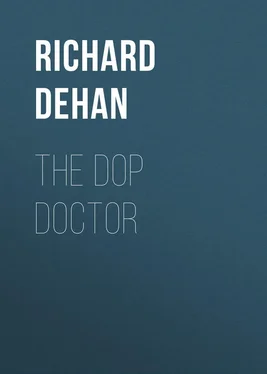Richard Dehan - The Dop Doctor
Здесь есть возможность читать онлайн «Richard Dehan - The Dop Doctor» — ознакомительный отрывок электронной книги совершенно бесплатно, а после прочтения отрывка купить полную версию. В некоторых случаях можно слушать аудио, скачать через торрент в формате fb2 и присутствует краткое содержание. Жанр: foreign_antique, foreign_prose, на английском языке. Описание произведения, (предисловие) а так же отзывы посетителей доступны на портале библиотеки ЛибКат.
- Название:The Dop Doctor
- Автор:
- Жанр:
- Год:неизвестен
- ISBN:нет данных
- Рейтинг книги:5 / 5. Голосов: 1
-
Избранное:Добавить в избранное
- Отзывы:
-
Ваша оценка:
- 100
- 1
- 2
- 3
- 4
- 5
The Dop Doctor: краткое содержание, описание и аннотация
Предлагаем к чтению аннотацию, описание, краткое содержание или предисловие (зависит от того, что написал сам автор книги «The Dop Doctor»). Если вы не нашли необходимую информацию о книге — напишите в комментариях, мы постараемся отыскать её.
The Dop Doctor — читать онлайн ознакомительный отрывок
Ниже представлен текст книги, разбитый по страницам. Система сохранения места последней прочитанной страницы, позволяет с удобством читать онлайн бесплатно книгу «The Dop Doctor», без необходимости каждый раз заново искать на чём Вы остановились. Поставьте закладку, и сможете в любой момент перейти на страницу, на которой закончили чтение.
Интервал:
Закладка:
Then she went, moving with the long, smooth, light step and upright, graceful carriage that she had somehow caught from the Mother-Superior, out of the room. Curious eyes followed her; sharp ears, that had caught fragments of the colloquy, wanted the rest; eager tongues plied Greta with questions, as she stood reticent, knowing, bursting with information withheld, in the middle of the class-room, where honours she coveted had been won and prizes gained by the charity-bred foundling.
You may be sure that Greta told the story. It lost nothing by her telling, be equally sure. But all that heard it did not take it in Greta's way. The stamp of the woman who ruled this place was upon many minds and intellects and hearts here, and her teaching was to bear fruit in bitter, stormy, bloodstained years of days that were waiting at the very threshold.
"I tell you," said Christine Silber, the handsome Jewess, with a fierce flash of her black Oriental eyes, "foundling or charity girl, or whatever else you choose to call her, Lynette Mildare is the pride of the school."
Silber's father was President of the Groenfontein Legislative Council. A hum of assent followed on her utterance, and an English girl got up upon a form. She was the niece of a High Commissioner, daughter of a Secretary of Imperial Government, at Cape Town, who wrote K.C.M.G. after his name.
"Silber speaks the truth. Not a girl here is a patch on the shoes of Lynette Mildare. I am going home to London next winter to be presented, and we shall have a house in Chesterfield Gardens for the season, and if Lynette will come and visit us, I can tell her that she will be treated as an honoured guest. As for you, Greta Du Taine, who are always bragging about your father and his money, tell me which three letters of the alphabet you would find tattooed upon his conscience – if the strongest microscope ever made could find his conscience out? Shall I tell you them?" She held up her finger. "Shall I tell you how he bought those orange-groves at Rustenburg – and the country seat near Johannesburg – and the drag with the silver-mounted harness and the team of blood bays?"
"No, please!" begged Greta, flinching from the torture.
But the English girl was pitiless. She checked the letters off upon her fingers:
"I. D. B."
A shout went up from the Red Class.
Greta turned and ran.
IX
The cell was a large, light, airy room on the first-floor of the big two-storied Convent building that stood in its spacious, tree-shaded, high-fenced gardens beyond the Hospital at the north end of the town. Tall stained-wood presses full of papers and account-files covered the wall upon one side. There also stood a great iron safe, with heavy ledgers piled upon it. Upon the other three sides of the room were bookshelves, doubly and trebly laden, with Latin tomes of the Fathers of the Church, and the works and writings of modern theologians, many of them categorised upon the "Index Expurgatorius." Rows there were of English, French, German, Italian, and Spanish classical authors, and many volumes of recently-published scientific works. It might have been the room of a business man who was at the same time a priest and a scholar. There were roller maps upon the walls, and two or three engravings, Bougereau's "Virgin of Consolation," the "Madonna dei Ansidei" of Raffaelle, and a "Crucifixion" over the chimneypiece, which had three little statuettes in tinted alabaster – a St. Ignatius at one end, a St. Anthony of Padua at the other; in the middle, the Virgin bearing the Child.
The Mother-Superior sat writing at a bare solid deal table of the kitchen kind, with stained legs to add to its ugliness, and stained black-knobbed fronts to the drawers in it. Her pen flew over the paper.
Seated though she was, you could see her to be of noble figure, tall and finely proportioned. The habit of the nun does not hide everything that makes for beauty and for grace. The pure outlines of the small, perfectly-shaped head showed through the thin black veil that fell over the white starched coif. The small, high-instepped foot could not be hidden in walking; the make of the thick shoe might not disguise its form. The delicate whiteness and smooth, supple beauty of her hands, larger than the hands of ordinary women, their owner being of more heroic build, as of ampler mind and keener intellect, betrayed her to be a woman not yet old, though there were some deep lines and many fine ones on the attentive face that bent over the large square sheet of paper.
It was a curious face; its olive skin bleached to dull whiteness, its expression stern almost to severity. I have heard it likened to a Westmoreland hill-landscape. Lonely tarns lie under the black brows of the precipice; one feels chilly, and a little afraid. But the sun shines out suddenly from behind concealing mists, and everything is transformed to loveliness. I can in no other words describe the change wrought in her by her rare, sudden, illuminating smile. Her voice was the softest and the clearest I ever heard, a sigh made most audible speech; but in her just anger, only turned to wrath by the baser faults, the fouler vices, it could roll in organ-tones of thunder, or ring like a silver trumpet. And her eye made the lightning for such thunder, and the sword-thrust that followed the clarion-note of war.
She could have ruled an empire or a court, this woman who managed the thronged, buzzing Convent with the lifting of her finger, with the softest tone of her soft West of Ireland voice, devoid of all trace of the unbeautiful brogue, cultured, elegant, refined. As I have said, the lessons that she taught bore great fruit during that red time of war that was coming, and will bear greater fruit hereafter.
A little is known to me of the personal history of Lady Bridget-Mary Bawne – in religion known as Mother Mary of Bethlehem – that may be here set down. Some twenty-three years previously that devout Irish Catholic nobleman, the Right Honourable James Dominic Bawne, tenth Earl of Castleclare, Baron Kilhail, Count of the Holy Roman Empire, and D.L. for West Connemara, not contented with the possession of three very tall, very handsome, very popular daughters – the Right Honourable Ladies Bridget-Mary, Alyse, and Alethea Bawne – consulted his favourite spiritual director, and, as advised, offered his thin white hand and piously regulated affections to Miss Nancy McIleevy, niece and heiress of McIleevy of McIleevystown, the eminent County Down brewer, so celebrated for his old Irish ales and nourishing bottled porter.
This lady, being sufficiently youthful, of good education and manners, and of like faith with her elderly wooer, undertook, in return for an ancient name and the title of Countess of Castleclare, to find the widower in conjugal affection for the rest of his mortified life, and to do her best to supply him with the grievously-needed heir. There was no wicked fairy at Lord Castleclare's wedding, distinguished by the black-browed beauty of the three bridesmaids, his daughters; and two years later saw the beacons at the entrance of Ballybawne Harbour, on the West Connemara coast, illuminated by the Castleclare tenants in honour of the arrival of the desired heir, upon whom before his birth so much wealth had been expended by Lord Castleclare in pilgrimages, donations, foundations, and endowments that, some months after it, his lordship conveyed to his three daughters that, in the interests of the Viscount, to whose swollen gums a gold-set pebble enclosing a pious relic of an early Christian martyr was at that moment affording miraculous relief, he, their father, would be obliged by their providing themselves as soon as possible with husbands of suitable rank, corresponding religion, and sufficient means to dispense with the customary marriage portion.
Читать дальшеИнтервал:
Закладка:
Похожие книги на «The Dop Doctor»
Представляем Вашему вниманию похожие книги на «The Dop Doctor» списком для выбора. Мы отобрали схожую по названию и смыслу литературу в надежде предоставить читателям больше вариантов отыскать новые, интересные, ещё непрочитанные произведения.
Обсуждение, отзывы о книге «The Dop Doctor» и просто собственные мнения читателей. Оставьте ваши комментарии, напишите, что Вы думаете о произведении, его смысле или главных героях. Укажите что конкретно понравилось, а что нет, и почему Вы так считаете.












